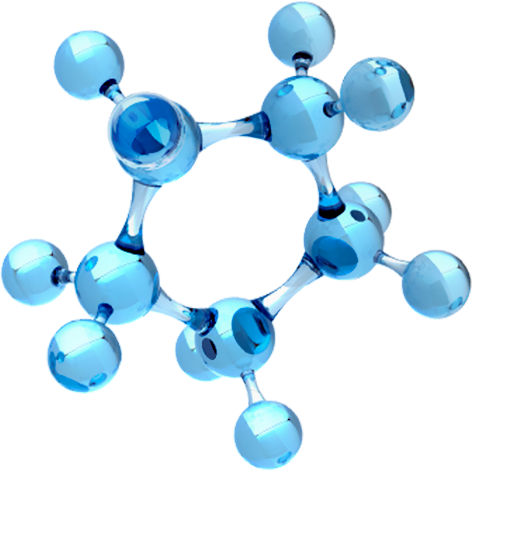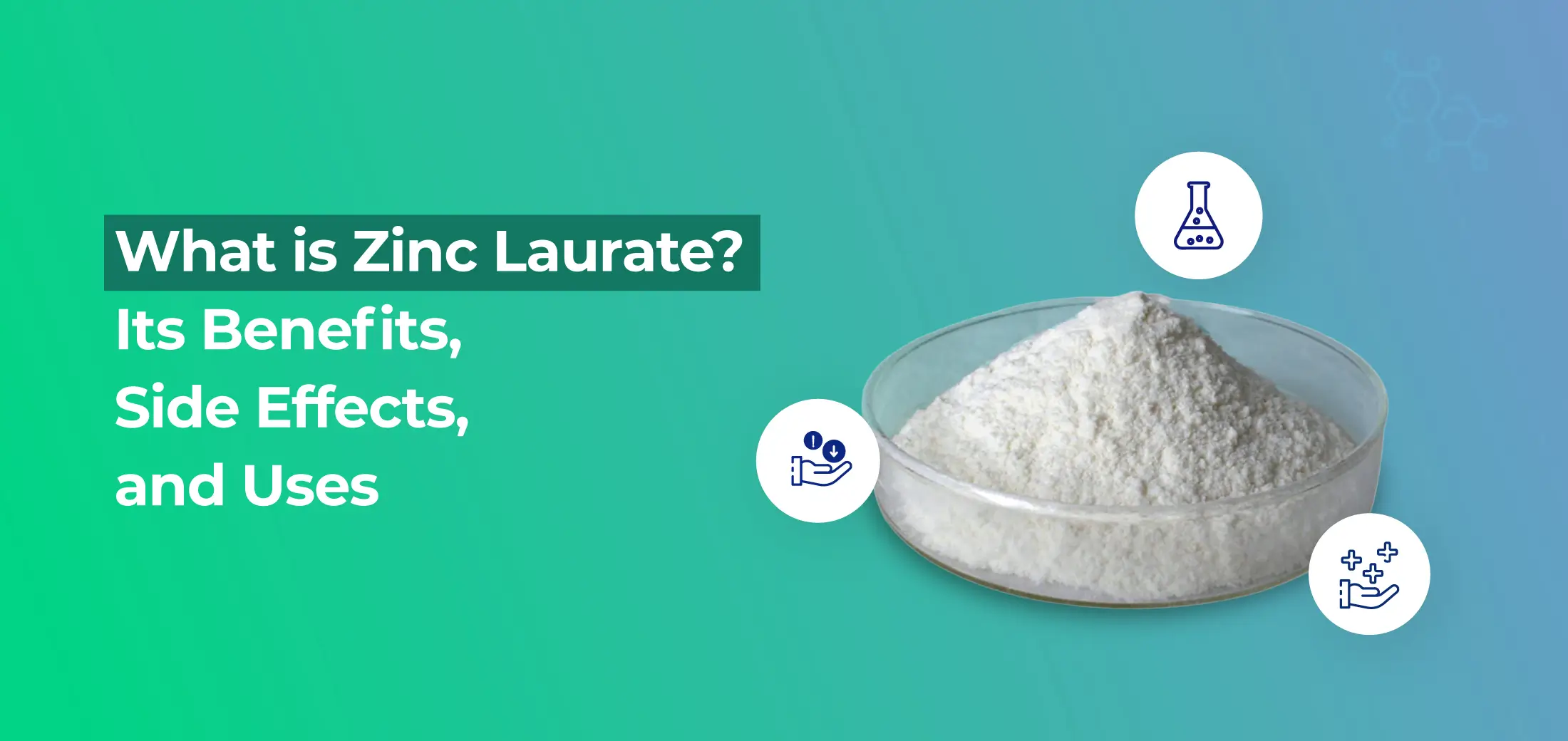Zinc laurate is a versatile chemical compound that comes in handy in various industries. It's the zinc salt of lauric acid, a fatty acid found in natural oils.
The composition of Zinc laurate is quite unique. Its properties make it a valuable compound that can be used as a lubricant, stabilizer, and additive.
Today, this compound is used in plastics, rubber, cosmetics, and pharmaceuticals. It goes a long way in improving the processing and performance of different products.
In this guide, we'll explore what zinc laurate is and get to know about its benefits and common uses.
Chemical and Physical Properties of Zinc Laurate
We'll study the practical uses of zinc laurate, but first, let's get familiar with its chemical and physical properties.
Chemical Structure and Composition
Zinc laurate is formed when zinc ions bond with lauric acid. Lauric acid is a saturated fatty acid that is found in coconut and palm oils.
With this zinc salt structure, it gets both metallic and organic properties. This makes the compound effective in different applications.
The basic chemical formula of zinc laurate is Zn(C11H23COO)2. It shows two laurate groups attached to a zinc ion.
Physical Properties
- Appearance : White or off-white powder or flakes
- Solubility : Insoluble in water but soluble in organic solvents such as oils and fats
- Melting point : Generally ranges between 140°C and 160°C
- Stability : Stable under normal storage conditions but sensitive to strong acids or bases
Due to these physical properties, zinc laurate proves particularly useful as a lubricant and stabilizer. It finds an extensive application in plastics and rubber processing, where thermal stability and compatibility with oils are crucial. Since it is insoluble in water, it proves to be a good ingredient in applications that demand resistance to moisture.
Uses of Zinc Laurate in Different Industries
Zinc laurate finds extensive use in the manufacturing of plastics and rubber. In these industries, manufacturers value their excellent lubricating and release properties. Zinc laurate helps in the smooth flow of materials through machinery, which reduces friction and wear. While this improves efficiency on one hand, it also enhances the surface finish of the products.
The compound also serves as a stabilizer or additive in polymer formulations. This helps in protecting plastics from degradation due to heat or oxidation. Zinc laurate also improves the dispersion of other additives. This makes it a good choice for manufacturers looking for a consistent and high-quality output.
Applications in Personal Care and Pharmaceuticals
Apart from industrial uses, zinc laurate is also in high demand in personal care products and pharmaceuticals.
In cosmetics, the compound is necessary to improve texture and spreadability. This gives a smooth and pleasant feel to creams. Zinc laurate comes with mild antimicrobial and anti-inflammatory properties, which make it a key ingredient in topical formulations.
All these benefits make zinc laurate useful in products that are meant to soothe your skin. It doesn't contain any harsh elements, which makes it a prime choice for consumers looking for safe and effective options.
Other Uses of Zinc Laurate
The versatility of zinc laurate lies in other areas, like coatings and paints. In these products, they work as an additive, thereby enhancing both durability and finish.
On the other hand, it is used in specialty formulations in manufactured products. Here, lubrication, stability, and compatibility with organic compounds are critical.
Considering this broad range of applications, zinc laurate proves to be a valuable ingredient across different industries.
As a trusted supplier, Nimbasia offers zinc laurate and related compounds to support manufacturers with high-quality materials.
Key Benefits of Zinc Laurate in Industrial Applications
Now, have a look at the key benefits of zinc laurate in industrial applications.
Boosts efficiency during processing
Zinc laurate plays a crucial role in smoothing manufacturing processes. Due to its natural lubricating properties, it reduces friction during the production of plastic and rubber. This helps machines run more efficiently and reduces wear and tear. For manufacturers, this significantly saves time and reduces maintenance costs.
Zinc laurate also improves the dispersion of additives within polymers. As a result, the properties of materials remain more consistent. The final result? Consumers get better-quality products.
Makes products stable
One of the key advantages of zinc laurate is the stability it offers to protect polymers. When they are exposed to heat or mechanical stress, polymers don't break down due to the presence of this compound.
Zinc laurate prevents oxidation and keeps thermal degradation at bay. In the process, it extends the lifespan of materials that are used in products like cables or packaging films.
In certain formulations, zinc laurate also helps with its antibacterial or preservative effects. This adds further value to applications where manufacturers prioritize hygiene and longevity.
Environmentally Friendly Profile
Traditional stabilizers may not be eco-friendly. However, zinc laurate has gained popularity for its biodegradability. Its toxicity level is relatively low. As a result, this compound has emerged as an attractive choice for manufacturers that prioritize sustainability without compromising on performance. Thanks to the cleaner profile, zinc laurate fits regulatory norms and market demands across the globe.
How to Use Zinc Laurate Effectively
Typically, zinc laurate is used in concentrations ranging from 0.5% to 3%. The exact concentration depends on the application.
In plastics and rubber, it serves as a stabilizer at these levels, optimizing the flow and stability of the products.
However, if you're manufacturing cosmetics or pharmaceuticals, lower concentrations are preferred to improve texture or provide mild antimicrobial benefits.
Storage and Handling Best Practices
We advise manufacturers to store zinc laurate in a cool and dry place. They must be stored away from direct exposure to moisture and heat. Ideally, the storage temperatures must be between 15°C and 30°C. With proper storage and handling, zinc laurate maintains a shelf life of at least one to two years.
Source High-Quality Zinc Laurate from Your Trusted Partner - Nimbasia
Whether you're into manufacturing plastics, personal care products, or pharmaceuticals, you need a dependable source of zinc laurate to ensure the stability of your products. With responsible use, the compound enhances performance and safety, while leaving minimal impact on the environment. Established suppliers like Nimbasia offer high-quality zinc laurate that lives up to the standards of the industry. Source the essential compound from us as you stride towards sustainable manufacturing.









